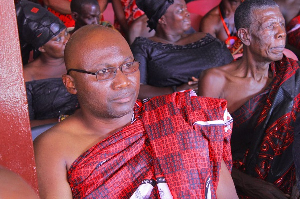- Home - News
- TWI News | TV
- Polls
- Year In Review
- News Archive
- Crime & Punishment
- Politics
- Regional
- Editorial
- Health
- Ghanaians Abroad
- Tabloid
- Africa
- Religion
- Election 2020
- Coronavirus
- News Videos | TV
- Photo Archives
- News Headlines
- Press Release
Opinions of Tuesday, 30 November 1999
Columnist: Maxwell Oteng
The Same Old Things: 40 Years Of Economic Mayhem And Little Hope
At 40, we should have had so many positive causes for celebrating the creation of our nationhood. But the euphoria with which Ghanaians greeted our independence from colonialism has, over the years, been fading into thin air so much so fast that ours is a country that epitomizes economic degradation, moral decadence and pessimism. In Ghana today so many people live at the margins of live, unable to afford two meals a day, amidst all the hype and noise about the so-called economic strides we have made recently in the gospel according to the government. Yes 40 years old, and we still have not come any closer to finding a way of extricating ourselves ( or the vast majority of the citizenry ) from the pawns of poverty.
Oftentimes, I, probably like most Ghanaians, have had to struggle with myself trying to think about the problems of economic development that have been confronting us as a nation ( I hope the editors of "Ghanaian Times" will not say that I have to be a president before I think about Ghana's problems), and almost all the time my struggles end up in frustration. I get frustrated and disappointed that bad leadership in our political history has denied us the opportunity of rubbing shoulders with some of the world's hopeful economies like South Korea and Malaysia. I really get disappointed that after 40 years as a nation, we are still being consumed by abject poverty despite all our endowed human and material resources, all because of selfish, kleptomaniac, visionless political leaders who have looted our national treasures, used state resources to pursue their own selfish political agendas and personal aggrandizement, and to persecute political opponents for no apparent reasons. These days most government officials want Ghanaians to believe that we are doing well economically, and they use economic conditions in some Sub-Sahara African countries as the barometer for comparison. This is ludicrous! How can a sick person compare himself/herself with another sick person? The bottom-line is that both of you are sick, and that is the situation in almost all economies in Sub-Saharan Africa. When one gets sick, it's better to measure your rate of recovery against a healthy person. It would be better to use countries like Malaysia, South Korea etc. as our measuring rod.
40 years ago, in 1957, Ghana offered one the brightest hopes of Sub-Saharan Africa. We stood almost on the same ( if not higher ) pinnacle as South Korea and Malaysia. Actually, we had a higher income, measured ( in economic parlance) by the gross national product ( GNP ), than that of South Korea. While the leaders of South Korea, Malaysia and other of our contemporary countries in East Asia diligently worked up their countries to enviable heights of economic development, our leaders have led us in an opposite direction into the dustbin of economic hopelessness.
We often hear the platitude in presidential addresses and academic arguments that colonialism, neo-colonialism and other external factors such as world economic regimes have been responsible for most of the problems we have been facing as a nation. But I am inclined to agree with Prof. George Ayittey that internal factors, with bad leadership at the very root, have been predominantly responsible for our present economic woes. There is no gainsaying that external factors have played their part, but to me these have only acted as catalysts to our decline.
Take a brief look at our contemporaries in East Asia. Just at the time that we were emerging from colonialism, South Korea was emerging from a devastating war. And countries like Malaysia and Indonesia were subjected to colonial rule as we were, and at independence were divided along similar ethnic, religious and linguistic lines. But these countries have been able to emerge from the shadows all these uncertainties to prosperity while we are still struggling to remove the abatross of underdevelopment from our neck. The main difference between these countries and Ghana is that, they have had highly disciplined and selfless political leaders with vision, and we have not.
The ugly truth is that our chequered political history is bereft of good selfless, visionary leaders ( safe one or two? ). Normally they seek power as humble people seeking to lead the country to prosperity, but soon get awashed in a haze of sybaritic abandonment and the promise of vistas of bliss comes nowhere near fulfillment. These leaders have run the country to suit their own whims and caprices. Even the highly celebrated and respected Dr. Kwame Nkrumah, without any intention of sneering at his political savvy and achievements, or denigrating his services to Ghana, and Africa, committed serious faux pas by charting the country's economy on socialist course. There were over-ambitious projects which we did not have the productive capacity to sustain, and thus had to rely on foreign expertise, such that when these foreign experts left, those projects collapsed. And the excessively direct participation of the state in the economy as the owner, producer and distributor of national wealth and resources tended to make people depend on the state for their share of national wealth much to the detriment of private sector development. As for the green-uniformed, holier-than-thou men, who intervened in our political processes without justifications, the least said about them, the better. They carried on the presidential fling with excessive ornateness and looting. With sheer military brute, they brutalized civilians and instilled so much fear in the people. Things were just horrible. With a couple of young, energetic "comrades" coming on the political scene, one would have taught that at least the Age of Aquarius had finally dawned in military politics. Yet this age never came and the cheat-fest continued. With all this military interventionism, the economy kept falling from the precipice because private sector entrepreneurship, both local and foreign, got stifled. And I guess that these military interventionists have realized, belatedly though, that it takes more than sheer military splurge, high-pitched speeches and arm flailing political jaywalking to rule a nation.
So 40 years old, but we are still like a child. We are entangled in a vicious cycle of poverty as depicted by all the fundamental economic indicators. We still do not seem to have learned anything from the past to move the country forward.
And now we sit on a "kwashiokor" economy in spite of the "reforms" we have been pursuing with the fervor of a reformed sinner. Kwashiokor economy, because the apparent small gains made seem unsustainable, inflation is too high, a lot of people are without jobs, etc. The country is still bathing in the same cesspool of corruption that characterized the later days of Acheampong/Akuffo regime.
The present economic conditions unfold some of the fundamental economic mistakes we have been making in recent years. We have chosen to develop the country up-bottom. That is, our economic policies have tended to foster economic activities based on imports of consumables instead of investment goods, and also on speculative and commercial activities. Today's Ghana imports everything including even plantain from the Cote d'Ivoire. Most economic activity in Ghana are in the service sector, while the industrial and agricultural sectors, which hold the key to our development, have been neglected or stifled by government policies. We need to wake up from our slumber, and move the country on the right course. The irony is that the country is endowed with so many natural resources that can make countries like Singapore and Japan envy, yet we are misusing them.
What Ghana needs is a political leadership that is selfless and disciplined Only a disciplined leadership can genuinely inspire people for development, and reduce the spate of corruption that has engulfed the country.
In addition, we would be better off if we directed our attention to the agricultural and industrial sectors instead of the service sector by encouraging local private initiatives instead of discouraging them. A president cannot advise his people not to buy goods produced by local private companies because of political differences. And our all-out liberalization policies have not helped local industries to produce and compete both internally and externally because of the cheap imported substitutes. The experience of East Asia shows that all-out trade liberalization policies do not help because they kill those industries that have the potential to be very competitive. The difference between East Asia's and our industrial policies is that in the former, the governments do not own industries. Instead government policies protect the privately-owned industries so that they would be able to compete globally. In our case, industries were (are) owned by the state, so protecting them gave (give) incentives to workers to shirk. Fortunately, however, Ghana has the advantage of being a late comer, because there are so many successful economic models out there from which to choose and perfect our choice within the context of our culture and traditions. We can no longer afford the luxury of experimenting with ill-advised, inappropriate and oftentimes alien economic models which have seen us teeter-tottering on the brink of disaster.
Finally, the government must realize that it does not hold any monopoly over knowledge, and so it is necessary to make full use of our brightest and fecund human resources irrespective of our different political inclinations. In this light, I would like to propose that we have an Economic Summit to which we shall invite our brightest and productive minds in academia, business, management, politics, in fact all walks of our national life, to honestly discuss and debate the best course of economic development for our beloved country. Together we can build!










